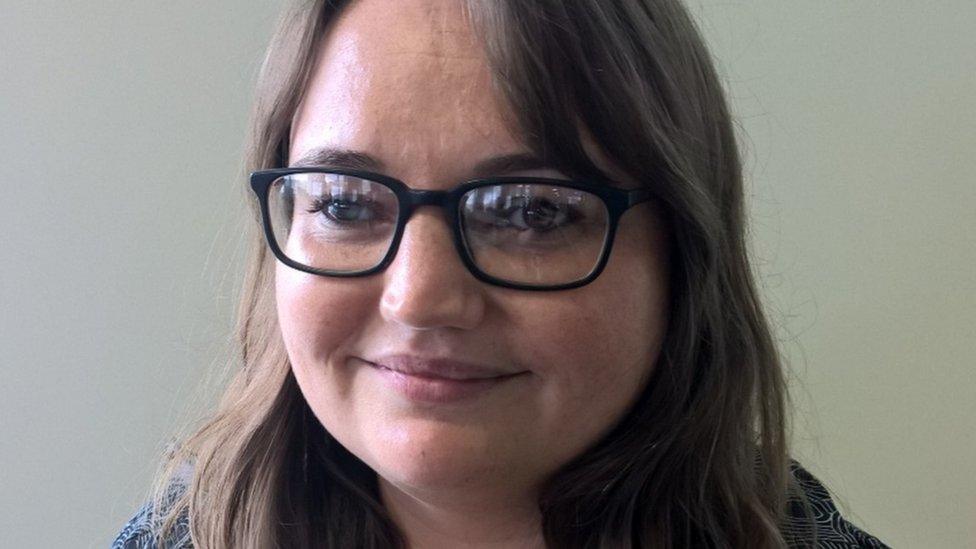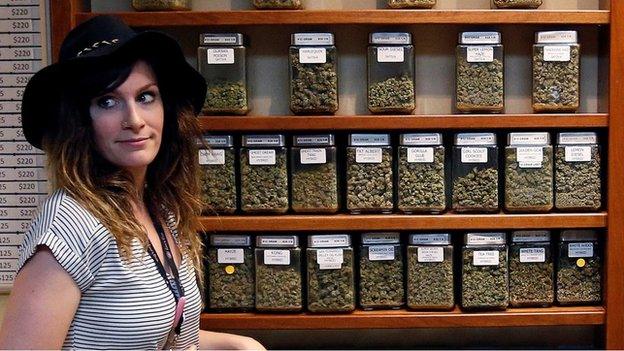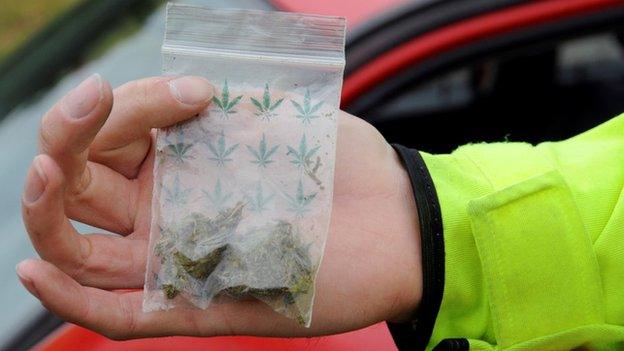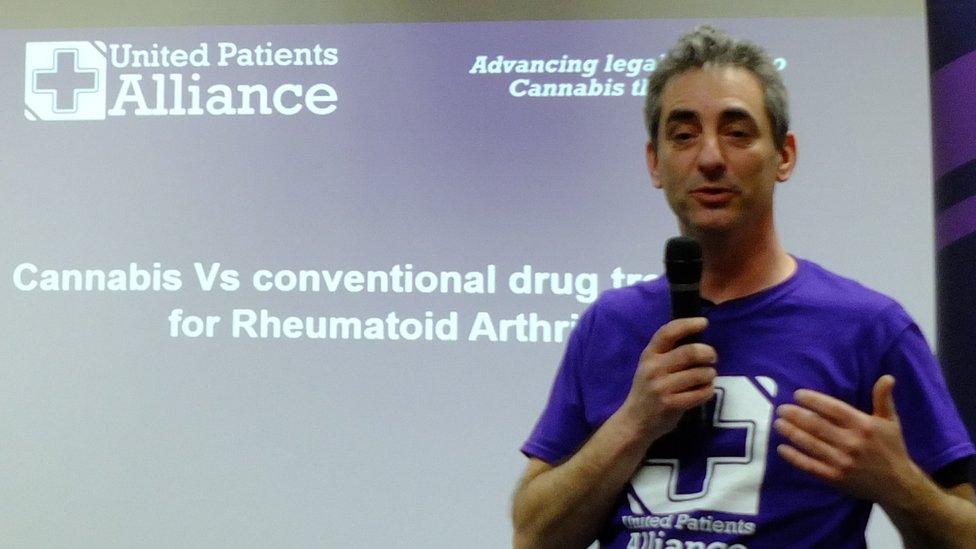'I know cannabis is illegal, but it is medicinal'
- Published

Faye spends about £250 a month making her own capsules and creams
Cannabis should be legalised for medical use, a cross-party group of MPs has said, but there are thousands of people already using the Class B drug for this purpose.
"I am seriously considering emigrating to Australia, Jamaica or the US," says Faye Jones.
The 32-year-old PA from Wokingham jumps every time there's a knock at the door and tiptoes around neighbours who might call the police.
Her crime? Five years ago, Faye was diagnosed with rheumatoid arthritis and after suffering from the side effects of prescribed drugs, she now uses cannabis to ease her pain, nausea and inflammation.
In the UK, where cannabis is a Class B drug, police can issue warnings or on-the-spot fines for possession of a small amount, while courts can impose sentences of up to five years for possession of larger amounts and up to 14 years for those who supply or produce it.
Faye - a campaigner for United Patients Alliance (UPA), which is calling for cannabis to be legally accessed by patients - has a raft of places she could start a new life.
Medicinal cannabis is legal - or being legalised - in 25 US states, and in countries from Canada to Italy.
"But I'd rather not leave the country I was born in," she says. "Mum would be devastated."
'The results are clear'
Perhaps now she won't have to. A group of MPs has called on the government to legalise medical cannabis after publishing the results of a seven-month inquiry into medicinal use of the drug.
The All Party Parliamentary Group (APPG) for Drug Policy Reform took evidence from 623 patients, professionals and experts and more than 20,000 scientific and medical reports were reviewed.
"The results are clear. Cannabis has a medical benefit for a wide range of conditions," says Mike Barnes, a professor of neurological rehabilitation.

A cannabis sales counter in Colorado, which was the first US state to legalise the drug
However, the NHS warns, external that cannabis use carries a number of risks, such as impairing the ability to drive, as well as causing harm to lungs if smoked and harm to mental health, fertility or unborn babies.
It can also have other serious consequences, with users potentially vulnerable to developing psychotic illnesses, the Royal College of Psychiatrists says, external.
A Home Office spokesman said the government had no plan to legalise cannabis, adding: "There is a substantial body of scientific and medical evidence to show that cannabis is a harmful drug which can damage people's mental and physical health."
Yet the End Our Pain campaign, external, which supports the legalisation of medical cannabis, estimates that one million people across the UK rely on the drug for medical reasons.

Analysis

By Michelle Roberts, health editor, BBC News online
After weighing the evidence, experts say there is a clear therapeutic role for medical cannabis.
There is good evidence that it helps alleviate the symptoms of chronic pain, MS and nausea associated with chemotherapy, as well as anxiety.
But for treating other conditions, such as depression, headaches and epilepsy, there is limited or no convincing evidence that it works.
Like any drug, cannabis can cause side effects.
Smoking cannabis in a joint rolled with tobacco can make asthma worse and probably increases the risk of lung cancer.
Regular cannabis use puts some people at increased risk of psychotic disorders, such as schizophrenia, and can also reduce fertility.
Cannabis is addictive and you may experience withdrawal symptoms such as cravings, difficulty sleeping, sweating and shaking.
Cannabis affects how the brain works. It can make users feel very anxious and even paranoid, it can make it difficult to concentrate and learn.
The United Patients Alliance says 30% of cannabis patients surveyed by the APPG cited depression as a reason for self-medication - though patients reported multiple conditions and depression often accompanies other primary conditions.
About a quarter of patients said they used the drug to combat anxiety and a quarter mentioned pain.
Almost 70% of the patients surveyed said they had tried conventional medicines first, before turning to cannabis.
No high
Doctors told Faye she would have to take low dosages of cancer drugs for the rest of her life to deal with her rheumatoid arthritis.
But after suffering hair loss, frequent sickness and "brain fog", her job became untenable and her boss took her aside.
"I'd just bought a house and had a mortgage - I couldn't afford to lose my job," she says.
Inspired by MS patients, she tried cannabis and now spends about £250 a month making her own capsules and creams, mixing cannabis oil and coconut oil.
Faye says she takes the pills "like I would ibuprofen, when I need them", claiming that the low dosage is not enough to make her high.
Along with 38% of users surveyed by the APPG, she also uses a vaporiser to consume the drug.
Fewer than a third smoke it with tobacco; one in five smokes it without tobacco. Others eat it, take capsules or use creams.
'I did my research'
MS patient Penny Fitzlyon, from London, said she was prescribed a variety of opiates which "switched off all interest in the outside world".
She said they left her "feeling grotty and miserable", took away her sense of humour and made her constipated.
"Then after a second MRI scan, I overheard a nurse saying it wouldn't be long before I'd be in a wheelchair," she says. "So I started doing my own research. Cannabis was the only thing I could find that hadn't killed anyone."
Penny, 52, says she tracked down a herbalist who, unlike street sellers, knew how to mix different strains of cannabis for different patients.
"We want to get rid of street dealers," she says. "Backstreet cannabis is not good - they mix it with sand or glass to make it look all sparkly and heavy."

Police can issue cautions or on-the-spot fines for cannabis possession
Some 72% of cannabis bought for medicinal use is purchased on the street or from friends, but 20% of users grow their own, in groups or by themselves. The remainder is sourced on the internet or abroad, according to those surveyed by the APPG.
Penny, who has been cautioned by the police twice, estimates that she spends £5,000 a year on cannabis - a fraction of the £30,000 annual cost of MS prescription drugs, she says.
Though she avoids "getting stoned", without small doses of the drug Penny finds simple tasks such as walking to the shops "incredibly painful".
'Angry and disenfranchised'
For Jon Liebling, from Reading, brushes with the law have only made him more determined to fight for the right to use cannabis as a medicine.
A traumatic childhood, with a mother who attempted suicide and an absent father, left Jon anxious, depressed and struggling to concentrate at school. But after trying cannabis at university, he didn't look back.
"I knew it was illegal", he says, "But it just worked. All the pain and stress I'd carried in my back, shoulders and neck for years just went."
But the 48-year-old's use of cannabis would see him arrested by the police three times - forcing him to leave university, drop out of a nurses' training course and finally land him in court for growing his own.
Though the arrests led to no more than a slap on the wrist and a fine, he said they left him feeling "angry and disenfranchised".

Jon Liebling now campaigns for legalisation
"My life has been ruined by the law," he says. Now, as political director of the UPA, Jon says the conclusions of the parliamentary group are "incredibly exciting".
"I don't think judges really want to put people away for it," he says. "I was really honest with the judge about my medical history and he was really sympathetic."
Though Faye fears the police "taking away her medicine" or indeed sending her to prison, she says most people are "very understanding" - even potential employers.
She says she has mentioned her End Our Pain campaigning in numerous job interviews "and it never stopped me getting a second interview".
"I'm cannabis proud," she says.